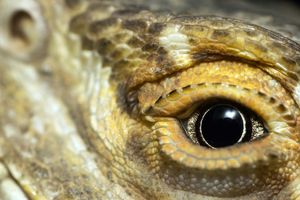
Adenoviruses are a type of contagious viruses that can affect a number of different species. Different species of this virus have been detected in many different types of reptiles, including turtles and tortoises, lizards, and crocodilians. So far, all adenoviruses detected in lizards have been in the genus Atadenovirus, with the most commonly seen being Agamid adenovirus-1 in Bearded Dragons (Pogona vitticeps) and is transmitted via the feces.
Clinical signs in lizards vary wildly from asymptomatic to neurologic signs including head tilt, circling, and abnormal carriage of the head. Some may exhibit gastrointestinal signs such as loss of appetite, weight loss, and diarrhea. Patients may also show lethargy, reduced growth, skin problems, difficulty breathing, mouth lesions, liver disease, and rarely death.
Gastrointestinal - anorexia, wasting, enteritis, diarrhea
Often patients with atadenovirus have coinfections with parasites, fungal infections, or other viruses. In addition, atadenovirus can lower the patient’s immune response and predispose them to many disease processes. Often patients appear to have like just intestinal parasitism or an upper respiratory infection that repeatedly happens or is not clinically improving once the symptoms have been treated. Those patients should be tested for Atadenovirus to evaluate for underlying problems.
Other potential conditions that can cause lethargy include Intestinal parasitism, improper care, hepatic lipidosis (“fatty liver disease”), stomatitis (“mouth rot”), vitamin A deficiency, renal disease, gout, cancer, trauma, and bacterial respiratory infection
For neurologic symptoms, other potential causes include trauma, cancer, parasite migration, nutritional secondary hyperparathyroidism (“metabolic bone disease”), renal disease, low blood sugar, toxins, septicemia, and vitamin E or selenium deficiencies.
The most common test to detect carriers of this virus is PCR testing of an oral or cloacal swab.
To evaluate for other causes and concurrent illnesses other tests that might be recommended include fecal parasite testing, complete blood count, serum biochemistry testing, and radiographs.
There is no virus-specific treatment, instead treatment is aimed at supportive and symptomatic care, improving husbandry. Positive animals should be isolated from negative animals and proper sanitation and biosecurity protocols should be maintained.
The prognosis is fair in patients without symptoms. However, prognosis is guarded to poor if clinical signs are not improving despite symptomatic and supportive care.
Your veterinarian will recommend appropriate rechecks based on your pet’s individual needs.
Copyright © All Rights Reserved
